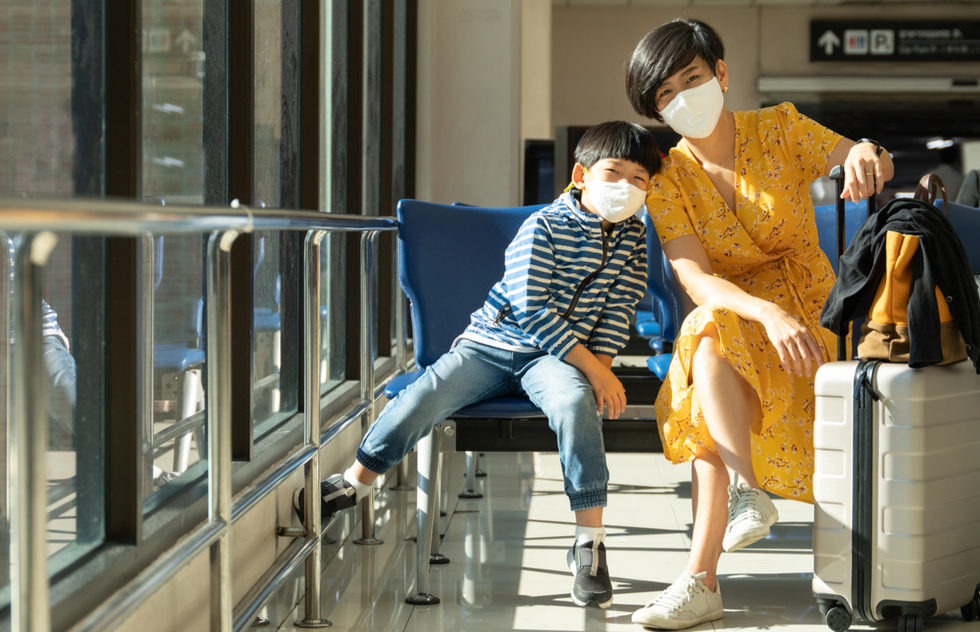The deadline for every state in the U.S. to make all adult residents eligible to receive a Covid-19 vaccine is April 19, according to the White House—and every state is expected to meet that benchmark.
Per the U.S. Centers for Disease Control and Prevention (CDC), fully vaccinated people (those who have waited two weeks since their final vaccine dose) can "travel safely within the United States" without undergoing testing or quarantine.
Those are two good reasons for travelers to pop open the champagne—and it's entirely appropriate that's an adult beverage because those positive developments do not yet apply to kids.
The Pfizer/BioNTech vaccine has been authorized for people aged 16 and older; injections from Moderna and Johnson & Johnson are for 18-year-olds and up.
Trials are underway, however, and Dr. Anthony Fauci of the National Institute of Allergy and Infectious Diseases has said that teenagers and middle schoolers could get vaccinated in time for the start of the school year this autumn, while younger children may have to wait until early 2022.
But what does that mean for your family vacation this summer? Are you in for another June, July, and August full of watching The Croods on repeat and trying to teach Grandma how to unmute Zoom?
Not necessarily—but vaccinated adults traveling with kids will have more to worry about than those leaving the house sans small fry (what else is new, am I right, parents?).
Here's what families need to know.
Visiting Vaccinated Relatives
The CDC's guidance states that the fully vaccinated can "visit with unvaccinated people from a single household who are at low risk for severe Covid-19 disease." And such gatherings can take place "indoors without [attendees] wearing masks or physical distancing."
Since Covid-19 infection and hospitalization rates are much lower among children than the rest of the population, youngsters qualify as low-risk in the above scenario. So vaccinated grandparents and other relatives can share meals with unvaccinated kids, stay in the same home, and, most important, catch up on a year's worth of missed hugs.
Note, however, that the CDC says this sort of thing is fine for members of a single household with unvaccinated children. If you mix in other young cousins or the offspring of friends, protect kids by holding gatherings outdoors and requiring unvaccinated attendees to wear masks.
For situations where families with unvaccinated kids get together for an extended time—like if their vaccinated parents rent a house together, say—CNN's Dr. Leana Wen recommends quarantining and testing for all unvaccinated individuals before the trip.
Traveling Domestically
As in the days before the vaccine rollout got going, taking road trips, going camping, and staying in vacation rentals remain the lowest-risk options for unvaccinated travelers, including children.
As for air travel, social distancing is hard to maintain on planes, but at least viruses can't transmit easily due to aircraft circulation and filtration systems. Do make sure everybody over the age of two stays masked, though—even squirmy toddlers.
Equally important is how you spend your time at the destination. Until your kids get their "Fauci ouchies," try to avoid crowds (beaches and national parks are good bets), opt for outdoor dining at restaurants, and don't let kids play with unmasked rug rats outside your household.
Traveling Internationally
Vaccinated adults traveling abroad with their unvaccinated children is a dicier proposition.
Many countries have already announced plans to waive quarantine and testing requirements for fully vaccinated visitors—but what if you've got a kid in tow who can't, by government decree, get the jab?
In Iceland—one of the countries accepting vaccinated visitors—the child will still need to quarantine for five days, reports the New York Times, and the parent will of course need to stay with the little (possibly infectious) dear regardless of the parent's vaccine status.
In other nations accepting proof of vaccination for entry, such as Belize, Croatia, and the Seychelles, those who aren't vaccinated, including kids, can skip mandatory quarantines by providing proof of negative Covid-19 test results. Usually, those results must be obtained within three days of travel.
Similarly, most of the islands in the Caribbean require testing for all travelers, vaccinated or not, and in many cases exempt small children from the rule.
So with testing, unvaccinated kids can still travel outside the country to many destinations. (Mexico doesn't even require the test—just fill out a form and bienvenidos a Cancún).
Nonetheless, families may want to think twice before crossing borders this summer.
For one thing, the CDC requires all travelers to provide proof of negative Covid-19 tests prior to entering the U.S. If your child's test comes back positive before you leave vacation to go home, you're going to have to quarantine in an unfamiliar country, with all the worry and expense that entails.
Plus, an international vacation might mean more time in airports and more places to expose vulnerable, unvaccinated lungs to new virus variants.
Taking a Cruise
Cruise lines are increasingly making vaccination a prerequisite to board.
Set to resume sailings in June, Royal Caribbean and Celebrity Cruises have said they will accept proof of negative Covid-19 test results from passengers under 18 in lieu of vaccination records.
But it looks like Norwegian Cruise Line will be adults-only into the fall.
"All guests and crew will need to be fully vaccinated for all sailings with embarkation dates prior to October 31, 2021," the company's website states. "Therefore, minors who have not yet been eligible to be vaccinated will not be permitted to sail on these voyages."
At least it's a firm no. Children appreciate clear boundaries.
As we've come to expect throughout the pandemic, things can change quickly. As you plan your family recreation this summer, it's a good idea to keep tabs on the CDC's frequently updated guidance for domestic and international travel in the Covid-19 era.






